Inside Eurovision with its directors: Banned acts, Ukraine's performance, and toxic stars
 TRI.Direction on Eurovision costs, Ukraine's performance, and new trends (Photos provided by the directors)
TRI.Direction on Eurovision costs, Ukraine's performance, and new trends (Photos provided by the directors)
What was Eurovision 2025 like from a director's perspective? Which acts impressed or disappointed? Is the final scoreboard shaped more by music or politics? The directors of TRI.Direction answer these and other questions in an exclusive interview.
This year, the directorial trio TRI.Direction - Nataliia Lobasieva, Nataliia Rovenska, and Mariia Hryhorashchenko - were at the very heart of Eurovision. They created the stage performance for Luxembourg while witnessing banned shows, odd decisions by organizers, unexpected flops, and emerging trends.
RBC-Ukraine spoke with the directors about the contest's inner workings, Ukraine's performance, toxic artists, shocking budgets, and why some shows are better left unseen by anyone.
– Your staging for the singer from Luxembourg was one of the most discussed. How much does a good Eurovision performance cost?
– A good performance at Eurovision is expensive – that's important to understand. It all depends on the concept: the more complex the content, the more people you need to involve, the more costumes to produce, and the more complicated the stage setup. And Eurovision performances are usually very complex.
Additionally, if special effects are used, they must be ordered from suppliers in the host country. Those aren't our prices, but European and special effects in Europe are extremely expensive. The same goes for props: even if they are compact and can be brought along, there's still the issue of disposal. If they're not taken back, that becomes another cost item.
There are many nuances that people in Ukraine don't even think about – logistics, technical requirements, and regulations. In the end, creating a spectacular Eurovision performance is always expensive. That's just the reality.
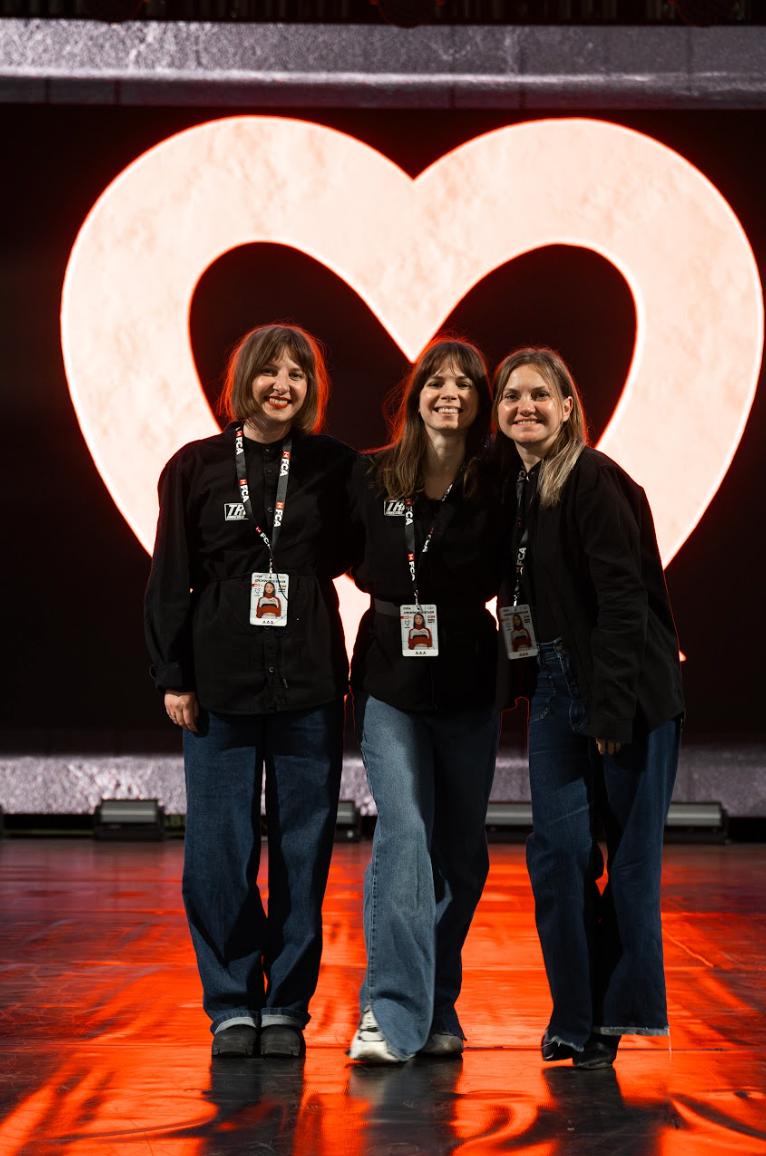
Nataliia Lobaseva, Nataliia Rovenska, and Mariia Hryhorashchenko (photo provided by the directors)
– Whose performance in this year's finale did you like the most, and which was a visual failure?
– This year, we felt – maybe because we were there for a long time, saw almost everyone, and watched performances several times – that Eurovision featured many strong performances. Not just songs, but actual performances – coherent both visually and conceptually.
Speaking of favorites, of course, we were impressed by Ukraine's performance. And not just because it's our country - it was genuinely high quality. It stood out: excellent visuals, strong TV appeal, and subtle directing that helped the audience feel the song more deeply. We liked everything - the artists, the costumes, the colors. It was definitely one of our top picks.
We also really liked Lithuania and Latvia. The mermaids from Latvia caught our eye even during their national selection - their visuals, the song, and overall delivery were all great. Italy was another favorite: an incredibly beautiful song and a strong performance. Afterward, we even wanted to learn more about the artist - we watched their music videos, which were the same style: grotesque, humorous, and visually refined. You can tell this is an artist with a presence beyond Eurovision.
We really liked Switzerland. It was one of those performances that seem minimalist - one person, a chamber atmosphere, cinematic delivery - but it's very difficult to make it so musically deep and modern. Nothing flies or explodes, but you watch and can't look away.
Austria also deserves mention - it was a completely different style, a very original choice. They stood out, and that was great. They had a modern retro feel, like something from a Robert Eggers film.
We loved the song from Germany's representatives, and judging by the points, Europe appreciated them, too. The visuals weren't extraordinary, but the song and the soloist's carefree, light manner were so strong that they carried the entire performance. It really worked.
As for the performances we didn't like, this, of course, is our trio's subjective opinion. Everyone has different tastes, someone likes one thing, someone else another. But our impressions were that Iceland, Ireland, and Australia fell short. They seemed visually outdated. There was nothing funny, ironic, or even conceptual – just very derivative and unremarkable staging. It felt like they were almost there, and a bit of tweaking could've made a difference – but it never happened.
This year, there were many similar performances overall. For example, three contestants used the alter ego theme: Cyprus, Belgium, and Czechia. All three are very modern performers, with great songs and stylish stagings. But none of them made it to the final, which surprised us.
Another trend this year was visually similar performances that we jokingly called "fire and ice." Many of them had fire, flying elements, dragons, and typical colors—blue and fiery red - all alternating. It felt like everyone was inspired by the same thing.
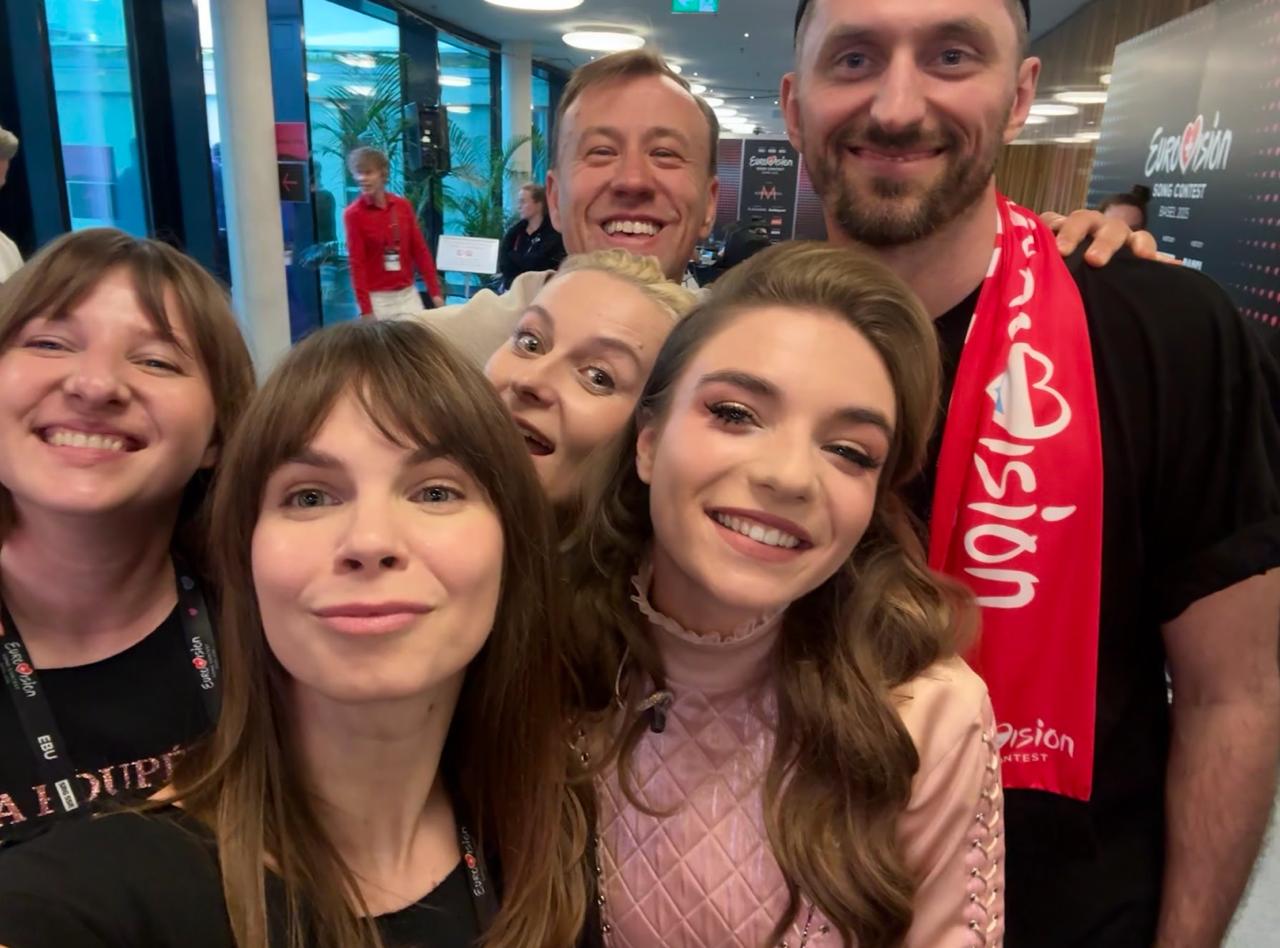 Ukrainian directors created the stage performance for Luxembourg (photo provided by the directors)
Ukrainian directors created the stage performance for Luxembourg (photo provided by the directors)
– What was wrong with Tommy Cash's performance?
– The main issue is that this artist is closely tied to Russia and collaborates with Russian directors; everyone knows it. That's the core problem, which overshadows everything else about this performance for us as viewers.
From a more professional standpoint, the artist's charisma looks pretty negative, both on stage and in life. You just don't want to follow his story or his performance. Although the song itself really "hooked" the audience, with tremendous viral power, the amount of effort put into the promo campaign before the contest was off the charts! This definitely influenced the public vote.
– What do you think of JJ's performance?
– We actually noticed him back during the national selection, as soon as it became known he would represent Austria. His staging already looked interesting then, and the video for the contest song – genuinely cool. The video was very stylish, and the song really showcases him as an artist: diverse musical genres, an intriguing image, and charisma.
We immediately thought Austria had a real chance to win - and honestly, we weren't surprised at all that JJ won. His performance was strong: theatrical yet modern. With well-thought-out, contemporary solutions, they managed to make the large stage feel not small but truly grand. The artist stayed true to himself, preserved his individuality, and even enhanced it.
If we're getting very subjective and nitpicky, we might have wanted more of the artist in the frame—more close-ups, his eyes, and face. The performance was dark and noir, with a striking atmosphere that worked brilliantly. But some details, micro-emotions, got a bit "lost." That's if we're really digging into the nuances.
– In your opinion, is Eurovision today more about music or politics?
– It's definitely 50/50. Half is music, evaluating the performance and the artist, and the other half is politics. The relationships between countries, statements, and the behavior of artists in certain political contexts always influence voting, especially the public vote. We don't think this is a secret to anyone. We all see how it plays out.
Of course, there are exceptions. If a song is truly strong and the artist is powerful, that can shift the balance. In those cases, music prevails: when the whole country is captivated by a composition, the political factor takes a back seat – like it or not, you vote for the music.
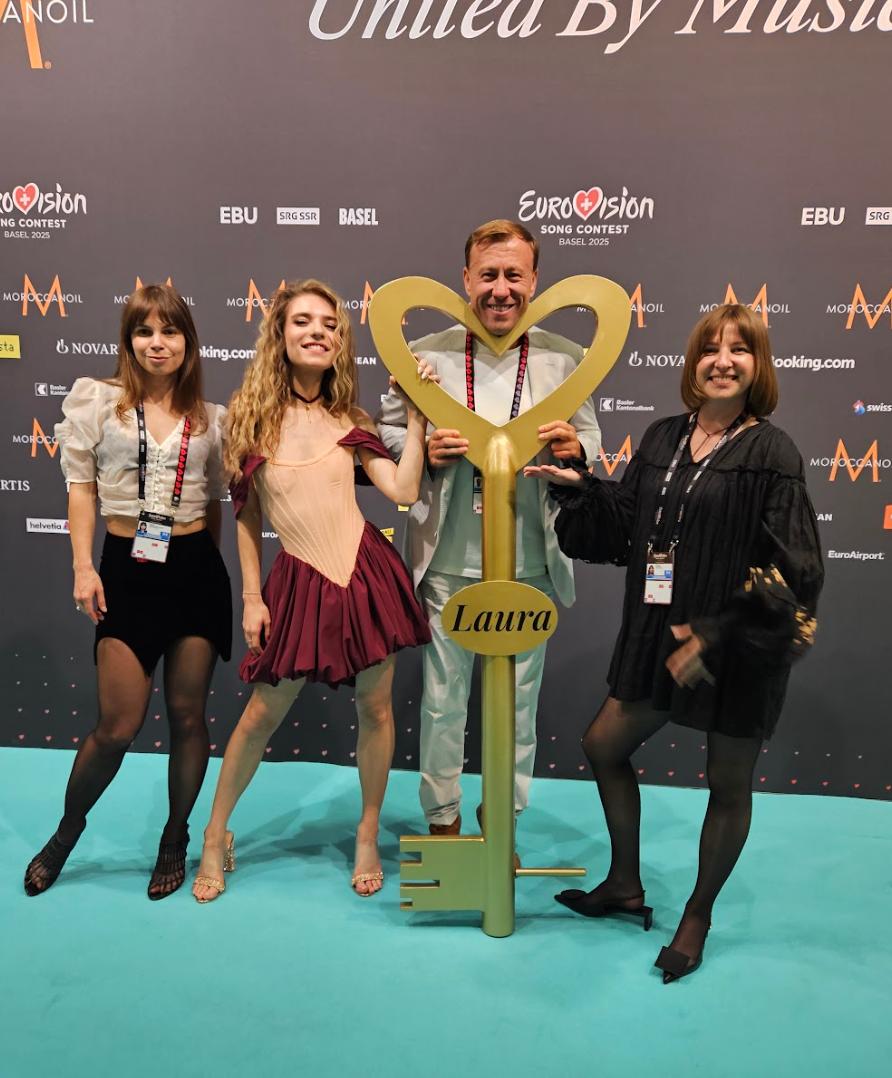
What happened at Eurovision (photo provided by the directors)
– This wasn't your first time working on Eurovision. Was there any censorship from the organizers or delegation? Did you have to cut or smooth anything over?
– Yes, this wasn't our first time with Eurovision. But essentially, it was the only one of its kind. Because to be honest, censorship from the organizers still exists – it hasn't gone anywhere. Clearly, political messages in performances aren't openly included.
With the performance for Laura, we didn't plan any political elements, so there were no objections from either the Luxembourg delegation or the organizers. The only request from the Luxembourg delegation was to add a flashback to Laura Thorn's show referencing the performance by France Gall, the Eurovision winner for Luxembourg 60 years ago. Her song back then was about whether a girl's voice could ever become loud enough. And now, Laura's song is somehow a sequel to that story.
We considered this and filled the act with small links, "Easter eggs." In our little house, which is the central element of the act, there is a TV showing a clip of Gall's performance. On the second floor, a dress identical to the one she sang in is hanging. The interior features scattered patterns that stylistically resonate with her performance. And even a retro microphone, precisely like the one France used.
But when we created "Welcome to Our House" (the non-competitive act by Rebecca Ferguson and Olena Topol for Eurovision 2023 - ed.), there were many moments that required discussion. Both the color scheme, the lighting, the symbols, the graphics, and the sounds - all of this was carefully coordinated with the organizers. At that time, we directly touched on the topic of war, and it was very important to present it as delicately as possible so that the meaning would be clear but would not violate the contest rules.
– Why do some countries invite Ukrainian directors? Is it a question of price or maybe a lack of their ideas?
– We want to emphasize clearly that it is not related to prices. If someone thinks inviting Ukrainians means that people are not paid or given only food, that is not the case. All prices are market-based, both in Europe and Ukraine.
They invite Ukrainians because they have long created high-quality content in various fields. Among them are many directors, choreographers, music video makers, cameramen, and film directors who have established themselves worldwide.
This is noticed and appreciated. For example, every year at Eurovision, the Ukrainian company OperTec, specializing in camera technologies, works. They are the only ones in Europe with such equipment and participate in this event annually, introducing new technologies for filming.
When we won the tender for the Luxembourg national Eurovision selection, the organizers and the head of the Luxembourg delegation were very pleased because they followed Ukrainian show business and saw the high level of professionalism of Ukrainians.
They invited us because Ukrainians impress. We have our standard of perfectionism in productions and other aspects, as well as boundless workaholism. We set high standards and achieved them thanks to our efforts. This applies to all Ukrainians they meet in different fields.
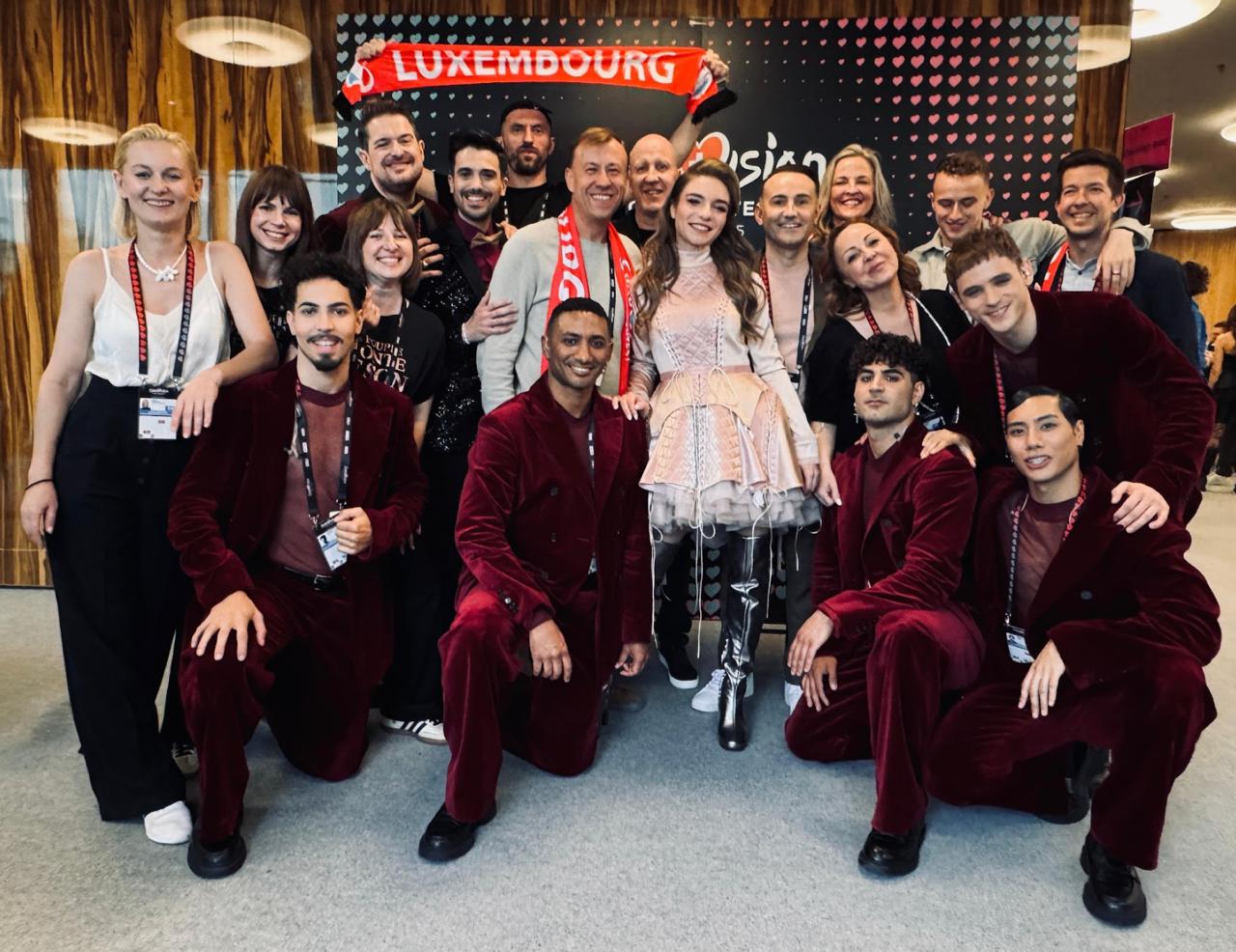 Ukrainian specialists staged a performance for Laura Thorn (photo provided by the directors)
Ukrainian specialists staged a performance for Laura Thorn (photo provided by the directors)
– Was working with Laura Thorn easier than with Ukrainian performers? What would you say are the most striking differences between the approaches of Europeans and our artists to creating concert shows?
– We already have experience working with European and American markets, artists, and so on, so there is no significant difference working with Laura or Ukrainian artists. She reminded us much of Nadia Dorofeieva with her workaholism, endurance, and politeness. Laura never leaves rehearsal if others are still working - she will work until the very end, even if she is tired or hungry. She is very responsible, never complains, and always tries to achieve the main result: if more work is needed, then it is required.
The cooperation turned out to be very easy. It's worth noting that Laura was practically an unknown artist before Eurovision. This was her first big stage and serious collaboration with the team around her. Our team had no disputes or dissatisfaction, which created a great atmosphere during rehearsals and meetings. The entire delegation was friendly and upbeat.
If we talk about the stage, the Ukrainian stage does not lose to European or American ones in any way. We are on the same level regarding quality, ideas, and everything else. The only thing that influences the difference is the budget. Especially now, when there used to be larger projects with bigger funding for artists, awards, and concerts. The budget allows more time for rehearsals, which then positively affects the result. When people have the opportunity to work without fatigue and hunger, they perform their work much more efficiently. That is the only difference - just the budget.
– Do you currently have requests from top global stars?
– We already have many parallel foreign projects we are working on. We don't even think about whether we need any more top stars. For example, there was a very cool moment when we met Conchita Wurst and her team. It was so pleasant as if we were old friends. We discussed all the participants, our favorites, and how everything happened.
After the national selection, the team asked us to provide the video content we created (the singer performed at the national selection in Luxembourg as a guest - ed). They plan to use it to present their song. According to them, they "conceptually thought through how to present the song around this content."
This was especially pleasant for us because we had never shared similar material with anyone before. Now they need to show this content primarily to us, as the authors of the act that became part of their presentation concept. And then, as they say, we'll see!
– Is there anyone on the Ukrainian pop scene you would never want to work with, even for a lot of money?
– Interesting question. Someone once even told us, "God, you're so stupid! You could already be earning well - and have cars and apartments." But we are sincere directors. That doesn't work with us.
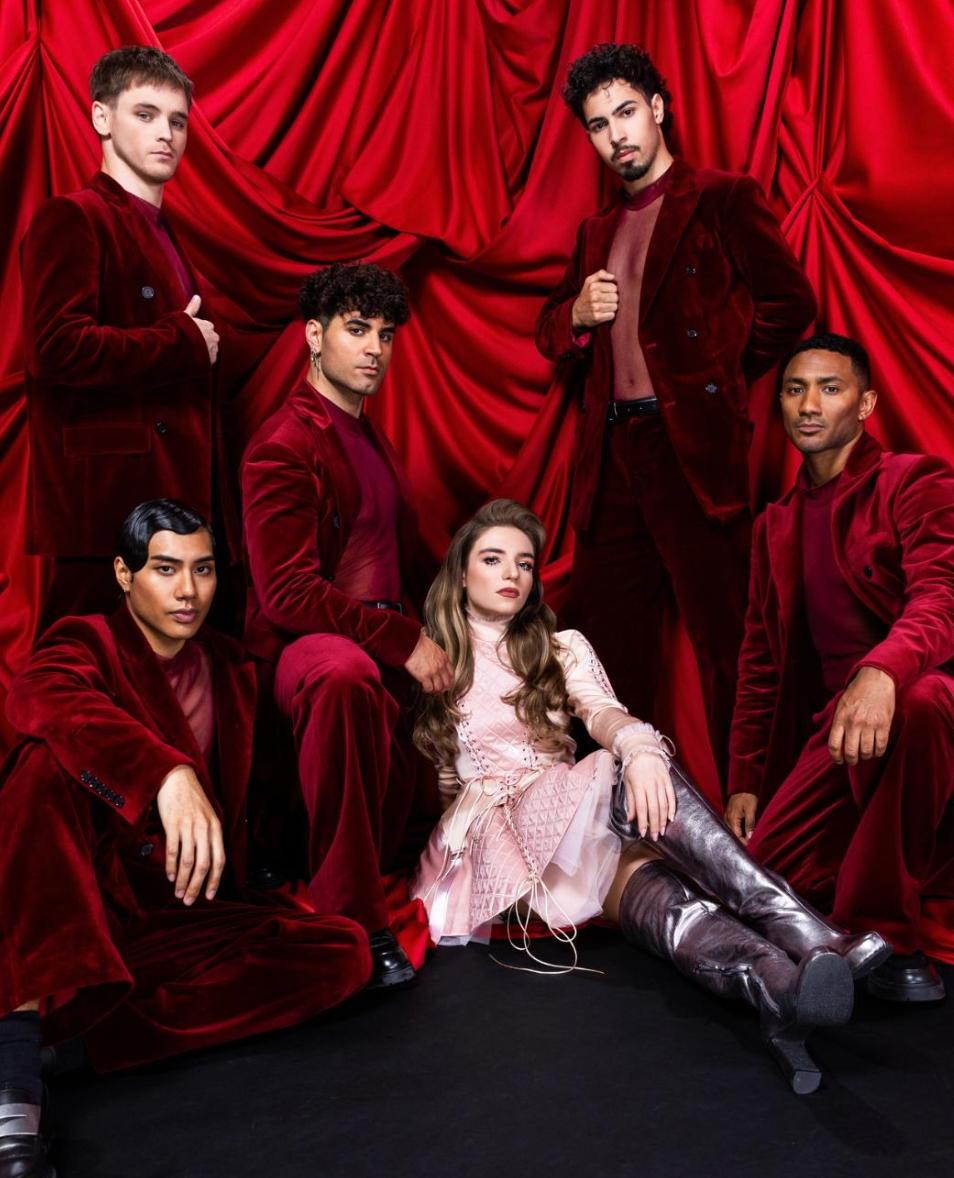 Laura Thorn (photo provided by the directors)
Laura Thorn (photo provided by the directors)
– So it's not enough for some artist to just come to you, throw a lot of money, and say, "Create a performance for me"?
– There have been cases, to be honest, when we were offered any fees, any money - just do it. But we refused. In general, we often refuse.
Of course, you can take the money and come up with something. But if you don't create a quality product for the artist, which is very important for us, what is the value of that? We have to be satisfied with the result ourselves. We don't work with the approach "it will somehow pass - and that's good." We are not the kind who do something carelessly just to earn faster and move on to the next project.
It's essential for us to find a solution and formulate a vision. We refuse if we don't feel that we can really give something to the artist. That's who we are. And so far, thank God, we have remained true to ourselves.
– What annoys you most when working with Ukrainian stars: whims, budget, or "star sickness"?
– Oh, now we'll tell you what annoys us. Really interesting question. Thank you!
The first thing that annoys us greatly is when an artist does not understand what they are doing on stage. If they do not realize what they carry with their songs, they do not understand what they want, how they see themselves, and what exactly they are trying to convey with their creativity.
It's not even about our close creative process with the artist - this should be inherent in the person from the start. Because when there is none of this and everything comes down to a producer's construct where the artist just comes and performs something invented by someone else, it's not interesting. And we're not interested. Then the question arises: why sing at all if you don't understand what it's about and why?
The second point is the budget, not in the sense that it is small or large, but in that expectations often do not match possibilities. We even have an inside joke: the desires are off the charts, but the budget is not.
We often encounter situations when they want a project "like in Hollywood," but are not ready to invest even in the basic implementation. And then they wonder why nothing worked out. We always ask to state the budget right away - not to "cut" anything immediately, but to understand the limits. Because if you see from the start that the idea goes beyond the budget, it's better not to start at all, not to waste people's resources, and not to create false expectations.
When it is not your first time and you have experience, you can at least roughly estimate the cost of implementation. So this issue is one of the basics.
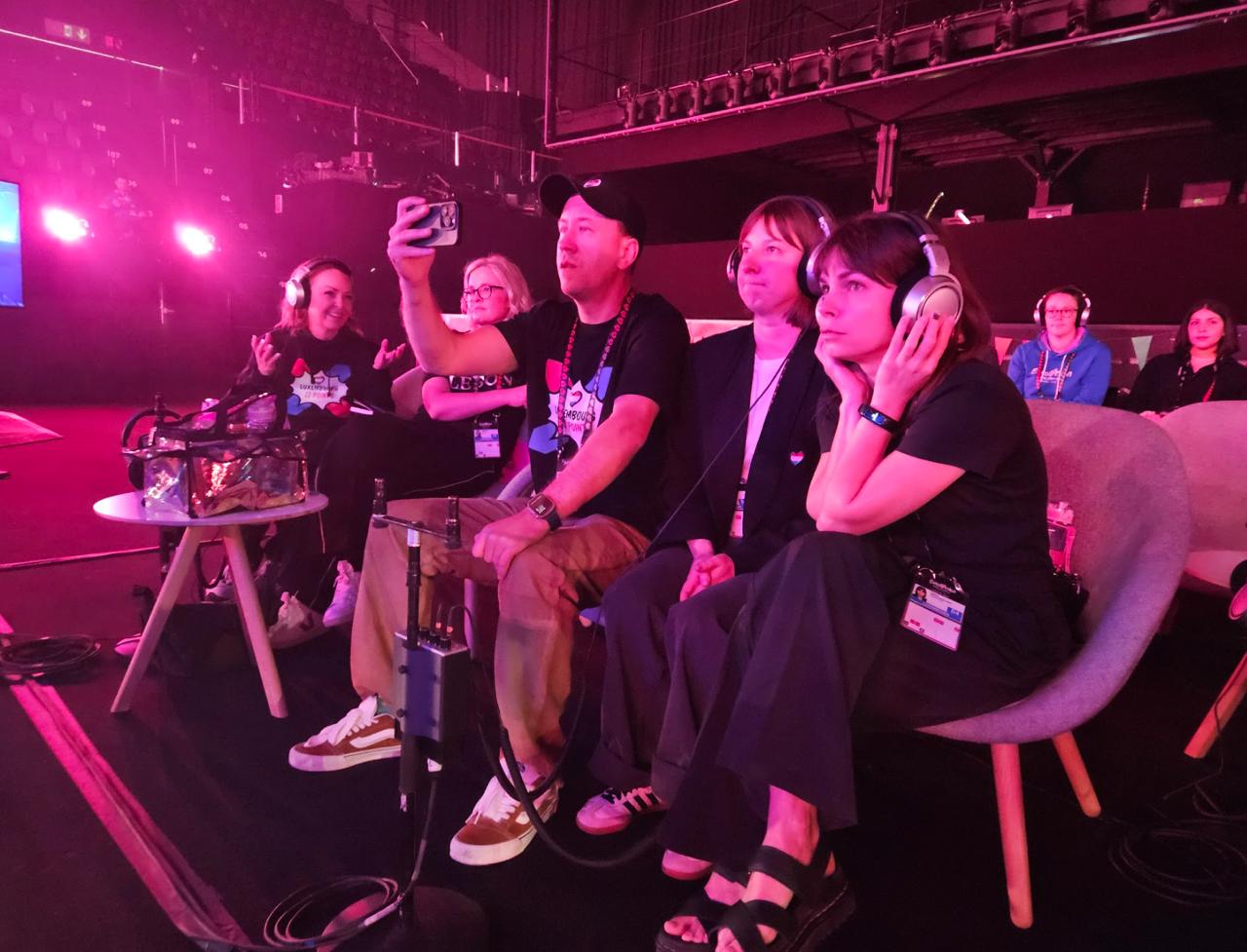 Ukrainian directors talked about working at Eurovision (photo provided by the directors)
Ukrainian directors talked about working at Eurovision (photo provided by the directors)
– How do you assess the role of women directors in modern show business? Have you encountered gender stereotypes in your career?
– We highly value the role of women directors in modern show business. But just as well - the role of male directors. In fact, gender doesn't matter at all here. What matters is what you create, what results you achieve, and your goals. This defines who you are in the profession.
No one told us anything like, "You're a woman - go make borsch," or "I'm a man - I'll be a director." We have not encountered that. Fortunately, we work in an environment where it does not matter.
– In one interview, you mentioned that you refused Jared Leto because of working on a Ukrainian project. Do you regret that decision?
Oh yes, that happened. We still sometimes smile when recalling that case: We refused Jared Leto, which means we can refuse anyone. But actually, no, we definitely do not regret it.
At that time, we already had several very complex projects. And it would have been much worse if we had taken on this performance and done it poorly. Then how would you "wash off" from that? When you are given a chance and you fail.
Maybe things could have turned out differently, but at that time, we just didn't feel strong enough to create something truly cool for an artist of that level within a minimal time. So we weighed everything and decided it was better to refuse than be ashamed of the result later.
Also, back then, we had much less experience. If such a situation happened now, when we are already leading five projects simultaneously and better understand how to distribute our strengths and priorities, we might act differently. But at that moment, it was the right decision.
We do not regret it - it's part of our creative path. Perhaps that refusal was necessary so that later we could meet again and definitely make something confident, strong, and high-quality.
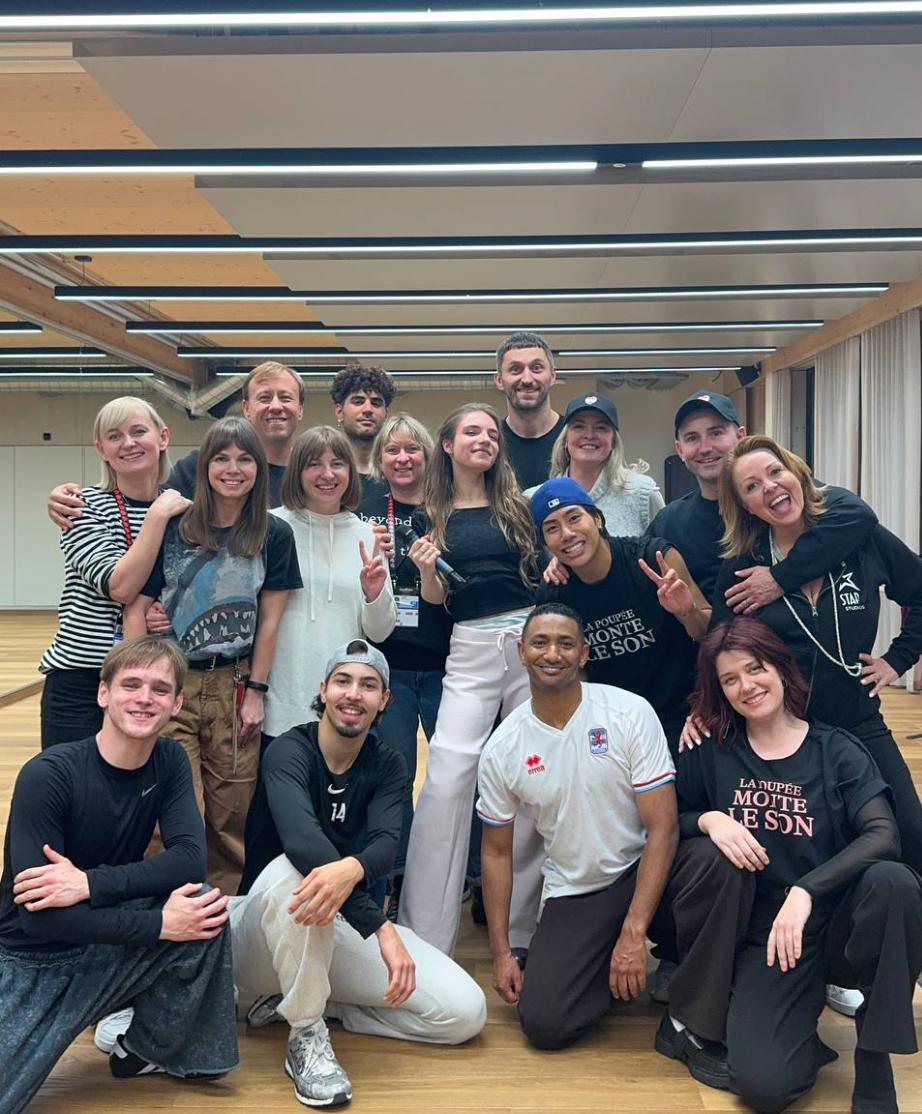 How performances were staged at Eurovision (photo provided by the directors)
How performances were staged at Eurovision (photo provided by the directors)
– What kind of show should be done so that Ukraine has a real chance to win Eurovision soon?
– Actually, if you look at Ukraine's performances at Eurovision in general, you can see that we are doing well, both with the shows and with the songs. For over ten years now, it seems that Ukraine has either won or consistently entered the top 10. Ukrainian artists and songs at Eurovision have always been at a high level.
We would like to add faith and support from the audience so that everyone can approach the selection and preparation of the performance with ease and inspiration, not with constant confrontation.
We dream that Ukraine can perform again lightly and carefree because right now, understandably, we cannot detach from the context.
We really want Ukraine to present a winning song next year. And it's not just about the place in the final - it's important that it is a strong, iconic song that we will all be waiting for and sincerely believe in. The first place for us will definitely come, and not just once. We are confident in that.

